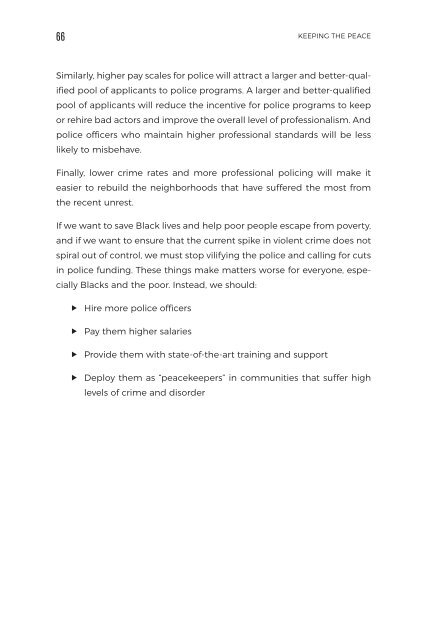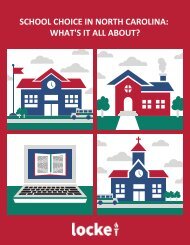Keeping the Peace Through Intensive Community Policing
As crime soars and the breakdown of public order takes its toll on our country, analysis from the John Locke Foundation signals it’s time to adopt a different approach to crime control, one that shifts the focus further upstream, looking at prevention models, rather than exclusively on punitive measures. In this July 2021 report, John Locke Foundation researcher and author Jon Guze explains that the current focus of catching, convicting, and punishing perpetrators after crimes have been committed has come with enormous economic and social costs. However, intensive community policing has proven successful at deterring crime and maintaining order, which leads to safer communities and fewer people living in poverty. Guze recommends a four-pronged plan to move forward with community policing: (1) hire more police officers (2) increase the pay for police officers (3) arm police officers with state-of-the-art training, direction, and support (4) deploy police officers as “peacekeepers” in communities that suffer most from crime and disorder.
As crime soars and the breakdown of public order takes its toll on our country, analysis from the John Locke Foundation signals it’s time to adopt a different approach to crime control, one that shifts the focus further upstream, looking at prevention models, rather than exclusively on punitive measures. In this July 2021 report, John Locke Foundation researcher and author Jon Guze explains that the current focus of catching, convicting, and punishing perpetrators after crimes have been committed has come with enormous economic and social costs.
However, intensive community policing has proven successful at deterring crime and maintaining order, which leads to safer communities and fewer people living in poverty. Guze recommends a four-pronged plan to move forward with community policing:
(1) hire more police officers
(2) increase the pay for police officers
(3) arm police officers with state-of-the-art training, direction, and support
(4) deploy police officers as “peacekeepers” in communities that suffer most from crime and disorder.
Create successful ePaper yourself
Turn your PDF publications into a flip-book with our unique Google optimized e-Paper software.
66 KEEPING THE PEACE<br />
Similarly, higher pay scales for police will attract a larger and better-qualified<br />
pool of applicants to police programs. A larger and better-qualified<br />
pool of applicants will reduce <strong>the</strong> incentive for police programs to keep<br />
or rehire bad actors and improve <strong>the</strong> overall level of professionalism. And<br />
police officers who maintain higher professional standards will be less<br />
likely to misbehave.<br />
Finally, lower crime rates and more professional policing will make it<br />
easier to rebuild <strong>the</strong> neighborhoods that have suffered <strong>the</strong> most from<br />
<strong>the</strong> recent unrest.<br />
If we want to save Black lives and help poor people escape from poverty,<br />
and if we want to ensure that <strong>the</strong> current spike in violent crime does not<br />
spiral out of control, we must stop vilifying <strong>the</strong> police and calling for cuts<br />
in police funding. These things make matters worse for everyone, especially<br />
Blacks and <strong>the</strong> poor. Instead, we should:<br />
f Hire more police officers<br />
f Pay <strong>the</strong>m higher salaries<br />
f Provide <strong>the</strong>m with state-of-<strong>the</strong>-art training and support<br />
f Deploy <strong>the</strong>m as “peacekeepers” in communities that suffer high<br />
levels of crime and disorder











